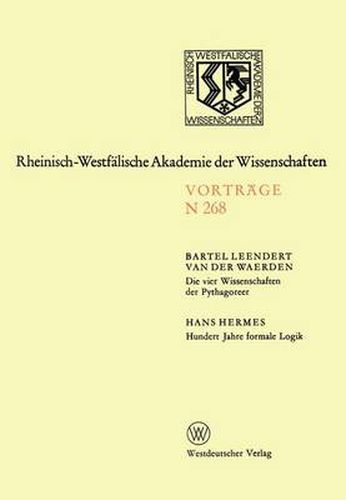Readings Newsletter
Become a Readings Member to make your shopping experience even easier.
Sign in or sign up for free!
You’re not far away from qualifying for FREE standard shipping within Australia
You’ve qualified for FREE standard shipping within Australia
The cart is loading…






This title is printed to order. This book may have been self-published. If so, we cannot guarantee the quality of the content. In the main most books will have gone through the editing process however some may not. We therefore suggest that you be aware of this before ordering this book. If in doubt check either the author or publisher’s details as we are unable to accept any returns unless they are faulty. Please contact us if you have any questions.
Formal logic presupposes a formal language. A rudimentary formal language was given by G. Boole. A formal language which was sufficient for the purpose of mathematics was constructed by Gottlob Frege in his book
Begriffsschrift, eine der arithmetischen nachgebildete Formel- sprache des reinen Denkens (1879). Since that time we have an abun- dant spectrum of logics based on formal languages. There are applications mainly in mathematics ( metamathematics ), but also e. g. in philos- ophy, linguistics and computer science. The most important formal language is the first order predicate calculus. There has been a gradual emancipation of this language via the theory of types given by Bertrand Russell. This paper discusses that development in some details. Diskussion Herr Hlawka: Sie haben gesagt, der Wiener Kreis sei tiber Carnap von Frege beeinfluBt gewesen. Ich wtirde eher meinen, tiber Russell. Dann haben Sie gesagt, daB bei Frege der Funktionsbegriff im Vorder- grund steht. Ich finde, daB dieser Gesichtspunkt gerade in der von Neu- mannschen Theorie verwirklicht ist. Herr Hermes: Von Neumann hat in der Tat den Funktionsbegriff als Grundbegriff der Mengenlehre gewahlt. Es hat aber niemand direkt dar- an angekntipft. Herr Hlawka: Vielleicht die moderne Kategorientheorie. Herr Hermes: Das stimmt. Herr Hlawka: Aber dann ist es doch so, daB der Pradikatenkalktil der ersten Stufe nur dann ausreicht, die klassische Mathematik zu begrtin- den, das heiBt kurz das, was bei Bourbaki steht, wenn man die Mengen- lehre als Fundament nimmt.
$9.00 standard shipping within Australia
FREE standard shipping within Australia for orders over $100.00
Express & International shipping calculated at checkout
This title is printed to order. This book may have been self-published. If so, we cannot guarantee the quality of the content. In the main most books will have gone through the editing process however some may not. We therefore suggest that you be aware of this before ordering this book. If in doubt check either the author or publisher’s details as we are unable to accept any returns unless they are faulty. Please contact us if you have any questions.
Formal logic presupposes a formal language. A rudimentary formal language was given by G. Boole. A formal language which was sufficient for the purpose of mathematics was constructed by Gottlob Frege in his book
Begriffsschrift, eine der arithmetischen nachgebildete Formel- sprache des reinen Denkens (1879). Since that time we have an abun- dant spectrum of logics based on formal languages. There are applications mainly in mathematics ( metamathematics ), but also e. g. in philos- ophy, linguistics and computer science. The most important formal language is the first order predicate calculus. There has been a gradual emancipation of this language via the theory of types given by Bertrand Russell. This paper discusses that development in some details. Diskussion Herr Hlawka: Sie haben gesagt, der Wiener Kreis sei tiber Carnap von Frege beeinfluBt gewesen. Ich wtirde eher meinen, tiber Russell. Dann haben Sie gesagt, daB bei Frege der Funktionsbegriff im Vorder- grund steht. Ich finde, daB dieser Gesichtspunkt gerade in der von Neu- mannschen Theorie verwirklicht ist. Herr Hermes: Von Neumann hat in der Tat den Funktionsbegriff als Grundbegriff der Mengenlehre gewahlt. Es hat aber niemand direkt dar- an angekntipft. Herr Hlawka: Vielleicht die moderne Kategorientheorie. Herr Hermes: Das stimmt. Herr Hlawka: Aber dann ist es doch so, daB der Pradikatenkalktil der ersten Stufe nur dann ausreicht, die klassische Mathematik zu begrtin- den, das heiBt kurz das, was bei Bourbaki steht, wenn man die Mengen- lehre als Fundament nimmt.